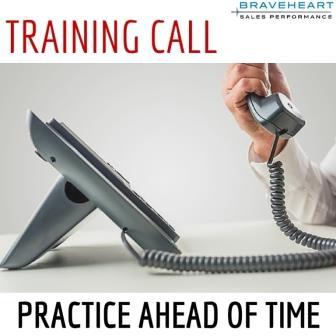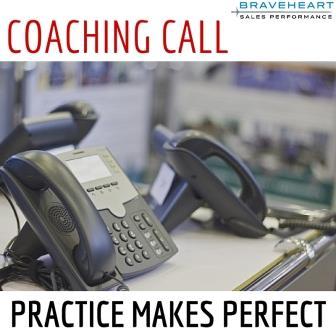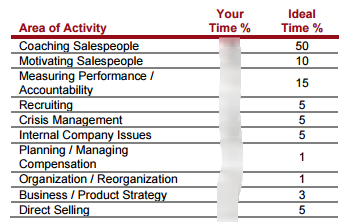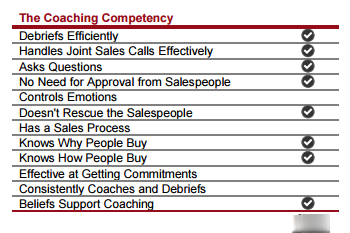
I had a great conversation with a highly talented VP of Sales of a successful sales organization the other day. We had a spirited debate about the role that a sales manager should play in joint calls with their sales reps. So this got me thinking more deeply about how to best approach those joint calls for the greatest success.
Of course there are two time frames when considering success, so it depends on your time horizon as to what success means.
For short term success, it would be reasonable to encourage the manager to take over the call, save the sale on the spot and win the business at all costs.
From a longer term perspective, it might make more sense to allow the salesperson a little room to handle it themselves, allowing for the fact that the call may not go perfectly. This process will be far more meaningful and helpful in actually developing the salesperson than a situation where the manager is always the closer.
ACTIONABLE TIP: the more the sales manager and sales rep practice for all types of situations, where the sales rep is actually practicing the words they will say, the more likely it is that the rep will be able to effectively handle the call on their own.
I have identified three types of joint calls and the appropriate role of the manager for each:

Training Call:
This is a situation where the sales rep is either new or is new to selling to this type of client or in this type of situation, as in a more complex larger sale for example. In a training call, it is perfectly acceptable to have the manager demonstrate the behaviors, assuming the manager is an expert salesperson themselves (not necessarily a given).
My suggestion would be that during training you actually have the sales rep observe a certain number of calls first and have them critique the sales manager. Then move to having the sales rep primarily conduct the call and have the manager there as a safety net, and to observe and critique.
Schedule a specific number of these types of calls and detail ─ in advance ─ when the sales manager might jump in. Or even agree on the fact that the sales rep can lob the conversation over to the manager at any time with a certain phrase. However, it will be more effective if the sales manager only chimes in when the sales rep signals they need help. If it is understood in advance that it is critically important to save the deal, then the sales manager has permission to dive in. My best recommendation is that you will have practiced so much in advance that this won’t be as necessary. Remember that a training call will also occur when the sales rep ventures into new territory either in difficulty or complexity of the sale or in terms of trying to sell unfamiliar products or services.

Title Matching Call:
In certain instances it is prudent for a sales rep to include their manager (or even their manager’s manager) in the call to “title match” the personnel on the client side. For instance, if the client will have a VP, COO or some other higher level executive in the meeting or on the call, then it is appropriate to have someone on your side with a bigger title involved. This should not always happen.
Eventually, we want sales reps to be able to position themselves as the consultant, the advisor, the individual that will bring value to the client’s business, regardless of the title. However, it is common practice, ostensibly for etiquette reasons, to bring in the big guns when selling to big guns.
I would argue that you might want to aspire to having your sales reps possess the appropriate executive presence that it might be a courtesy, but isn’t necessary. Otherwise, you run the risk of sales managers turning into glorified closers and your organization’s growth will be hindered by the fact that sales managers are the only ones that can close significant deals. I realize my position may be controversial. But, if you have a focus on getting all the people in the organization to rise to higher ground so that the business will grow and prosper without the requirement of management always needing to be involved then you will understand my position.
Spend more energy coaching and practicing with sales reps in advance of calls, to help them perform at a higher level. Help all the sales reps improve their sales skills and the company’s growth won’t be dependent on a few sales managers or executives.

Coaching Call:
This type of call should make up the bulk of the calling efforts that the sales manager does with an individual rep (after on-boarding and training obviously). These types of calls are specifically to help the sales rep continue to grow and improve. The sales manager should not intervene, other than to interject at predetermined moments.
These calls should be set up and run by the sales rep and there should be a thorough pre-call plan and a thorough debriefing afterwards, where the manager is really coaching and asking questions of the sales rep. Refrain from just telling them what you would do differently. Get the sales rep to think about how they could have performed differently.
The sales rep should indicate to the sales manager, in advance, what role the manager should play. The sales manager should resist the temptation to save the deal or rescue the salesperson. I know that is hard, but just as with any skill building, the individual will learn far better and far faster if they have to do it themselves. They will likely even learn better from their failures. Think of a golfer. Would we ever say “watch me do it, watch me do it, watch me do it”? Then send them off to the play in the Masters and expect them to perform well? Of course not.
It is the same thing with selling. The more you get the sales rep to do the job, rather than just telling them or showing them, the quicker they will become proficient. Quick reminder: The sales manager can always call the prospect back following a failed call and thank them for their patience. Explain they were helping the salesperson grow and ask for a second bite at it. You would be surprised how many prospects will appreciate this and give you a second chance.
The Importance of Sales Calls As a Coaching Tool
Doing joint calls and training calls are an essential part of effective sales coaching. According to the OMG Sales Manager Evaluations that we use, a full 50% of an ideal sales manager’s time is spent coaching salespeople. Coaching is by far the single most important activity for a sales manager’s effectiveness. And, you will see by that same evaluation, a key part of a sales manager’s coaching competency is to not rescue the salespeople.
Percent of Time a Sales Manager Should Spend Coaching, per OMG: 50%

10 Elements That Make Up Coaching Competency, per OMG:

What do you think about the sales manager’s role on a joint sales call? Do you disagree with this, or have a different approach? Join the conversation in the comments.

Images courtesy of OMG’s Sales Manager Evaluation, © 1992-2014 Objective Management Group, Inc.
This article was syndicated from Business 2 Community: Sales Managers: How to Win at Joint Sales Calls
More Sales & Marketing articles from Business 2 Community:




